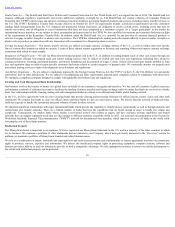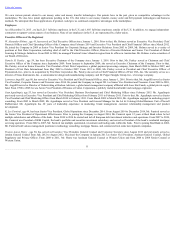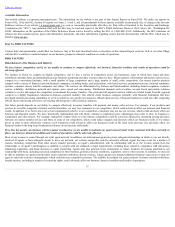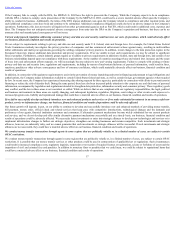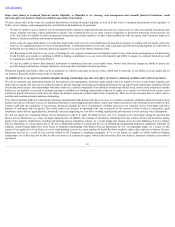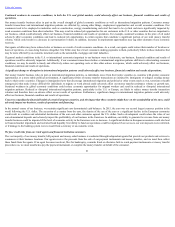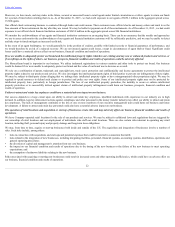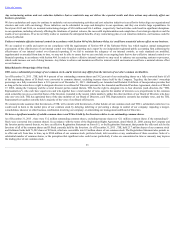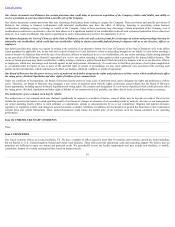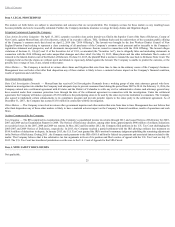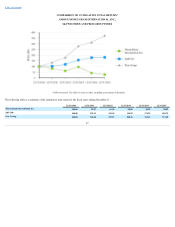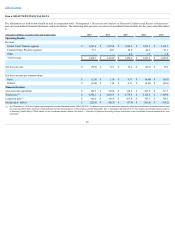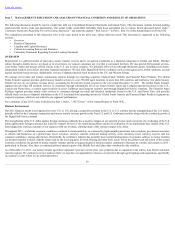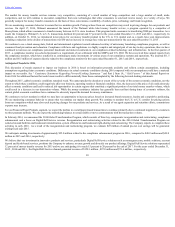MoneyGram 2015 Annual Report Download - page 21
Download and view the complete annual report
Please find page 21 of the 2015 MoneyGram annual report below. You can navigate through the pages in the report by either clicking on the pages listed below, or by using the keyword search tool below to find specific information within the annual report.
Table of Contents
A breach of security in the systems on which we rely could adversely affect our business, financial condition and results of operations.
We rely on a variety of technologies to provide security for our systems. Advances in computer capabilities, new discoveries in the field of cryptography or other
events or developments, including improper acts by third parties, may result in a compromise or breach of the security measures we use to protect our systems. We
obtain, transmit and store confidential consumer, employer and agent information in connection with certain of our services. These activities are subject to laws
and regulations in the U.S. and other jurisdictions. The requirements imposed by these laws and regulations, which often differ materially among the many
jurisdictions, are designed to protect the privacy of personal information and to prevent that information from being inappropriately disclosed. Any security
breaches in our computer networks, databases or facilities could lead to the inappropriate use or disclosure of personal information, which could harm our business
and reputation, adversely affect consumers’ confidence in our or our agents' business, cause inquiries and fines or penalties from regulatory or governmental
authorities, cause a loss of consumers, subject us to lawsuits and subject us to potential financial losses. In addition, we may be required to expend significant
capital and other resources to protect against these security breaches or to alleviate problems caused by these breaches. Our agents and third-party independent
contractors may also experience security breaches involving the storage and transmission of our data as well as the ability to initiate unauthorized transactions. If
users gain improper access to our, our agents' or our third-party independent contractors' computer networks or databases, they may be able to steal, publish, delete
or modify confidential customer information or generate unauthorized money transfers. Such a breach could expose us to monetary liability, losses and legal
proceedings, lead to reputational harm, cause a disruption in our operations, or make our consumers and agents less confident in our services, which could have a
material adverse effect on our business, financial condition and results of operations.
Because our business is particularly dependent on the efficient and uninterrupted operation of our information technology, computer network systems and
data centers, disruptions to these systems and data centers could adversely affect our business, financial condition and results of operations.
Our ability to provide reliable services largely depends on the efficient and uninterrupted operation of our computer network systems and data centers. Our
business involves the movement of large sums of money and the management of data necessary to do so. The success of our business particularly depends upon the
efficient and error-free handling of transactions and data. We rely on the ability of our employees and our internal systems and processes to process these
transactions in an efficient, uninterrupted and error-free manner.
In the event of a breakdown, catastrophic event (such as fire, natural disaster, power loss, telecommunications failure or physical break-in), security breach,
computer virus, improper operation, improper action by our employees, agents, consumers, financial institutions or third-party vendors or any other event
impacting our systems or processes or our agents' or vendors’ systems or processes, we could suffer financial loss, loss of consumers, regulatory sanctions, lawsuits
and damage to our reputation or consumers’ confidence in our business. The measures we have enacted, such as the implementation of disaster recovery plans and
redundant computer systems, may not be successful. We may also experience problems other than system failures, including software defects, development delays
and installation difficulties, which would harm our business and reputation and expose us to potential liability and increased operating expenses. In addition, any
work stoppages or other labor actions by employees who support our systems or perform any of our major functions could adversely affect our business. Certain of
our agent contracts, including our contract with Walmart, contain service level standards pertaining to the operation of our system, and give the agent a right to
collect damages or engage other providers and, in extreme situations, a right of termination for system downtime exceeding agreed upon service levels. If we
experience significant system interruptions or system failures, our business interruption insurance may not be adequate to compensate us for all losses or damages
that we may incur.
In addition, our ability to continue to provide our services to a growing number of agents and consumers, as well as to enhance our existing services and offer new
services, is dependent on our information technology systems. If we are unable to effectively manage the technology associated with our business, we could
experience increased costs, reductions in system availability and loss of agents or consumers. Any failure of our systems in scalability, reliability and functionality
could adversely impact our business, financial condition and results of operations.
20


